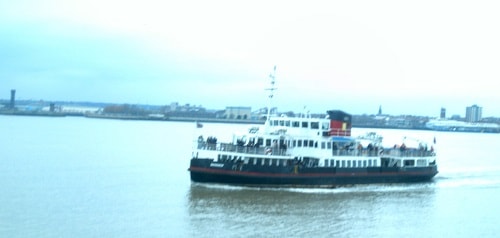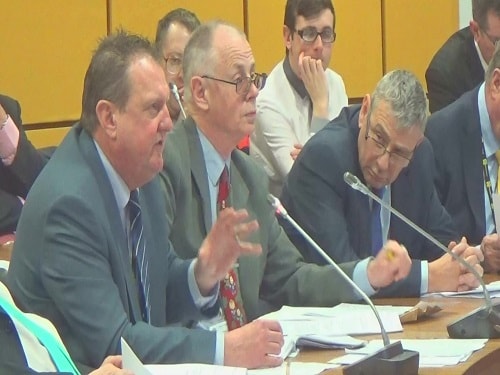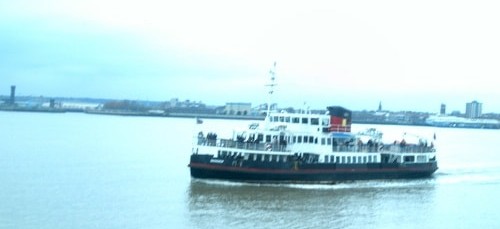Cllr Foulkes on Mersey Ferries “we cherish that service and want to maintain it”

This is an update to an earlier story headlined Will the 20 councillors on Merseytravel mothball the Mersey Ferry terminal at Woodside?.
After a long talk followed by a question and answer session with Jan Chaudry-van der Velde of Merseyrail the meeting got to the agenda item titled Mersey Ferries Long Term Strategy.
Here first is what Cllr Foulkes had to say during the meeting.

Please accept YouTube cookies to play this video. By accepting you will be accessing content from YouTube, a service provided by an external third party.
If you accept this notice, your choice will be saved and the page will refresh.
Merseytravel Committee meeting (part of the Liverpool City Region Combined Authority) meeting of the 7th January 2016 (Mersey Ferries item starts at 7m 51s)
Cllr Steve Foulkes (Wirral, Labour) spoke first, “Yes Chair, obviously we’re going to be moving something a bit later on, but I think I think there has to be some criticism I think from the elected Members in terms of the release of the report and the focus and attention on the negativity of it.
I think that I would like to turn this completely on its head and say that if I was a Leader of a Council or running a Council service and anybody was talking in terms of this day and age where the government that we have is actually savaging public services across the sector. It’s almost waging war on the public sector, if there was once, if I had a service and someone was coming forward with a bit of paper that was offering me a twenty year lifespan and beyond, I would grab that with both hands initially.
I would say that is undoubtedly positive news for the ferry service of this city region, an iconic ferry service that we as an organisation are planning for the next twenty, twenty-five years. So we have to take that as a very, very positive aspect and there are some very good initiatives within the report that would allow us to do that.
In particularly a way forward of getting new vessels which is key obviously we’ve been told they’re aging and vessels that will actually allow us to generate more income and make it even more sustainable. So the word is sustainability.
But obviously everyone’s eyes have been drawn to the one paragraph that doesn’t make good reading. But these are people who in their professional capacity have been asked to do if you know a helicopter view of the service and give us their deliberations.
And this is what to me is why I became a politician, why I joined these organisations is to actually have an influence on behalf of the people that I represent in using these facts, figures and information to actually develop the strategy and this is a good starting point for us for a strategy because that’s what it is you say Chair. It’s a discussion document for us to move forward.
Now I welcome the interest that’s been generated by this report and there are some good ideas coming from the public and from groups who are on their own calling themselves protest groups.
There’s absolutely no reason why those protest groups can’t become a useful ally, a tool in actually developing the strategy as we go on. So, for me it is a document that maybe could’ve been handled in terms of the PR issues a lot better.
But nevertheless it does give people some reassurance that this organisation cherishes the ferry service with all the economic problems it presents and the challenges it presents we cherish that service and want to maintain it for twenty, twenty-five years.
I think there’s a way forward that we can think about, certainly it highlights the purchase of the vessels, there are other models to purchasing the vessels. I would just ask just to consider certainly the logic and strategy we’ve used for building up the reserves for the rolling stock and the project management that we’ve gone through that all Members seem to appreciate it.
Could, alright the figures are still high by anyone’s measure we are talking twenties of millions of pounds in this document, but we can handle that in the simple way as we have to build up these reserves for the rolling stock, ie building up a reserve for capital, having some separate you know ways of generating money.
The other thing I would say though Chair, that that shouldn’t stop us from this long-term strategy we’ve debated. I still think that there are ways to make the ferry service more efficient and operationally more successful and there are things that are coming out, as we move on, and things that have already happened such as the annualised hours of the people that work on the ferries.
And there are some glaring costs that we need to remedy, for example keeping the boat on the River overnight with a full crew. It doesn’t seem a good use of public money. So there are lots of things we can do as we build up this strategy but my overall view is that apart from the one negative paragraph, it’s a positive way forward for the longevity of the much-loved ferry service and I’ll hope to reassure the public when you move your resolution. Thank you.”
If you click on any of these buttons below, you’ll be doing me a favour by sharing this article with other people. Thanks:

“But nevertheless it does give people some reassurance that this organisation cherishes the ferry service with all the economic problems it presents and the challenges it presents we cherish that service and want to maintain it for twenty, twenty-five years.”
As you don’t have a Royal Charter to stop running the Ferries, i suppose that means you’ve just have to keep running them then!
That’s a transcript of the first 8 minutes or so of a half-hour agenda item.
In the end councillors asked officers to come forward with an option to a future meeting that involves keeping all three terminals (Woodside, Seacombe and the Liverpool Pier Head).